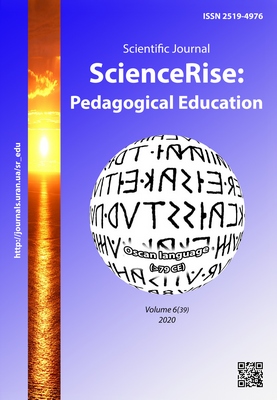Forming students' conscientious attitude to technical translation classes in a globalized world
DOI:
https://doi.org/10.15587/2519-4984.2020.217309Keywords:
technology, globalization, translation, systems, management, training, personality, level, professionalism, subjectsAbstract
This paper examines the process of managing technologies in the orientation of the university students` personality forming in technical translation classes from the position of a system-based approach in the globalization context. Observations show that technical fields students use the choice of language for translation not with the aim of broadening their general horizons and raising their educational level, but with the intention of acquiring specific knowledge and competencies necessary in the present and future. Due to globalization and integration students migrate abroad. The educational system faces the challenge of increasing its competitiveness. Technical translation teachers need to: set clear, well-prepared tasks for students; to reveal the scientific basis of pedagogical principles and recommended methodological provisions; apply optimal loads in tasks; give short explanations before doing new exercises; use live speech; take into account the commonality of goals; create subgroups, targeted samples depending on the characteristics of students. Autonomous and distance learning are associated with the formation of their willingness and habits to work independently and actively, the ability to consciously evaluate their linguacultural experience and the ability to correct it, make their own independent decisions and take responsibility for the results of technical translation. The implementation of this principle provides the students` mastery of various strategies for working with the language, which are based on interdisciplinary subjects of the curriculum. Fulfilment of individual, differentiated by the level of complexity and subject matter tasks develops the skills of autonomous work, the ability to work with reference literature, individually formulate and transmit the information received to others, develops thinking and creativity
References
- Nalivaiko, N. V., Ashilova, M. S. (2015). Globalizatsiia obrazovaniia i globalnye vyzovy sovremennosti. Filosofiia obrazovaniia, 1 (58), 26–37.
- Sidorenko, E. V. (2013). Osobennosti issledovaniia geopoliticheskoi kartiny mira v usloviiakh globalizatsii. Filosofiia obrazovaniia, 1 (46), 4–9.
- Dubicka, I., Keeffe, M. O. (2013). English for International Tourism. Pearson Education Limited, 128.
- Panov, S. F. (2008). Qualitatsmanagement und Qualitatssicherung im Ausbildung. Naukovi zapysky. Seriia “Pedahohichna”, 9, 571–574.
- Nikolaeva, S. Yu. (Ed.) (2003). Zahalnoievropeiski Rekomendatsii z movnoi osvity: vyvchennia, vykladannia, otsiniuvannia. Kyiv: Lenvit, 273.
- Alekseeva, I. S. (2006). Ustnii perevod rechei. Nemetskii iazyk. Saint Petersburg: Iniazizdat, 112.
- Komissarov, V. N. (2002). Lingvisticheskoe perevodovedenie v Rossii. Moscow: ETS, 184.
- Latyshev, L. K., Semenov, A. L. (2005). Perevod: Teoriia, praktika i metodika prepodavaniia. Moscow: Izdatelskii tsentr «Akademiia», 192.
- Chernovatyi, L. M., Lypko, I. P. (2019). Vplyv stratehii perekladatskoho skoropysu na yakist usnoho poslidovnoho perekladu. Visnyk Kyivskoho natsionalnoho universytetu imeni Tarasa Shevchenka. Seriia «Inozemna filolohiia». Kyiv: VPTs «Kyivskyi universytet», 1 (51), 45–50.
- Chernovatyi, L. M. (2019). Spivvidnoshennia sposobiv perekladu anhlomovnoi terminolohii u sferi finansiv pidpryiemstva. Naukovi zapysky. Seriia «Filolohichni nauky», 175, 662–667.
- Korunets, I. V. (2017). Teoriia i praktyka perekladu (aspektnyi pereklad). Vinnytsia: Nova Knyha, 448.
- Biker, M.; Baker, M. (Ed.) (1998). Translation Studies. Routledge Encyclopedia of Translation. London/New York: Routledge, 277–280.
- Kaindl, K. (1997). Wege der Translationswissenschaft. Ein Beitrag zu ihrer disziplinären Profilierung. Tex Tcon Text, 11, 221–246.
- Neubert, A.; Fleischmann, E. et. al. (Eds.) (1997). Übersetzungswissenschaft und Übersetzungslehre: Spannungen und Chancen, Hemmnisse und Möglichkeiten. Gegensätze und Gemeinsamkeiten, Isolation und Gemeinsamkeit. Translationsdidaktik. Grundfragen der Übersetzungswissenschaft. Tübingen: Narr, 3–14.
- Koval, T. I. (2007). Analiz dosvidu krain yevropeiskoho soiuzu shchodo profesiinoi pidhotovky z informatsiinykh tekhnolohii maibutnikh menedzheriv. Naukovi zapysky Ternopilskoho derzhavnoho pedahohichnoho universytetu. Seriia: Pedahohika, 2, 129–135.
Downloads
Published
How to Cite
Issue
Section
License
Copyright (c) 2020 Sergey Panov, Olena Smolnikova, Victoria Pabat

This work is licensed under a Creative Commons Attribution 4.0 International License.
Our journal abides by the Creative Commons CC BY copyright rights and permissions for open access journals.
Authors, who are published in this journal, agree to the following conditions:
1. The authors reserve the right to authorship of the work and pass the first publication right of this work to the journal under the terms of a Creative Commons CC BY, which allows others to freely distribute the published research with the obligatory reference to the authors of the original work and the first publication of the work in this journal.
2. The authors have the right to conclude separate supplement agreements that relate to non-exclusive work distribution in the form in which it has been published by the journal (for example, to upload the work to the online storage of the journal or publish it as part of a monograph), provided that the reference to the first publication of the work in this journal is included.







